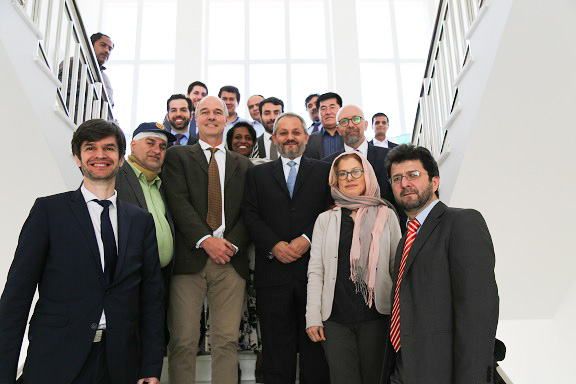Kabul, 10 May 2018
 Delegation and WHO representative in Afghanistan Dr Richard Peeperkorn met HE Minister Feroz in Kabul. Photo: Tuuli HongistoWorld Health Organization (WHO) and International Atomic Energy Agency (IAEA)'s Programme of Action for Cancer Therapy (PACT) conducted the first assessment of Afghanistan’s readiness to implement cancer control and care between 6 and 10 May 2018.
Delegation and WHO representative in Afghanistan Dr Richard Peeperkorn met HE Minister Feroz in Kabul. Photo: Tuuli HongistoWorld Health Organization (WHO) and International Atomic Energy Agency (IAEA)'s Programme of Action for Cancer Therapy (PACT) conducted the first assessment of Afghanistan’s readiness to implement cancer control and care between 6 and 10 May 2018.
The ImPACT mission consisted of a team of international experts on cancer prevention, diagnosis, treatment and care, who were joined by expert from International Agency for Research on Cancer (IARC) of the World Health Organization.
The objectives of the mission were to assess comprehensive national cancer control capacities and needs in cancer control planning, prevention, early detection, diagnosis and treatment, palliative care, cancer information and registration, education and training and civil society engagement. In addition, the needs and effective implementation of the country’s radiation medicine program were also assessed.
The mission visited more than 20 health facilities and organizations, mainly primary, secondary, and tertiary level health facilities of the Ministry of Public Health. In addition, private health facilities and their pathology departments and medical and health institutes were also visited.  Dr Supriya Warusavithana and Dr Andre Ilbawi from WHO visiting a mammography unit in Kabul. Photo: Tuuli Hongisto
Dr Supriya Warusavithana and Dr Andre Ilbawi from WHO visiting a mammography unit in Kabul. Photo: Tuuli Hongisto
The mission also met HE the First Lady of Afghanistan, Ms Rula Ghani, who noted that “There is a dire need for cancer diagnosis and treatment, especially for women and children. Currently, cancer is considered a death sentence for a person who has been diagnosed with it, which should not be the case, as the most prevalent cancers in the country, such as breast cancer and childhood cancers are amenable to proper treatment and care”.
The mission concluded with a briefing to HE the Minister of Public Health, Dr Ferozuddin Feroz, who stated, that “Non-communicable diseases are an emerging health problem in Afghanistan and we are still not prepared to provide adequate response for them. The findings of this mission are an eye-opener for the Ministry of Public Health. Due to resource constraints in the health sector, it is important that the mission prioritizes the strategic actions to be taken to strengthen cancer prevention, early detection, treatment and care according to the country context. The Ministry of Public Health is looking forward to the findings and recommendations of the ImPACT mission and committed to implementing the suggested interventions according to the available resources”.
WHO representative for Afghanistan Dr. Richard Peeperkorn noted the importance of the mission, thanking the team for their valuable insights. “The mission occurred in an opportune time, when the Ministry of Public Health is revising the health care delivery packages. Considering the transition of disease burden in Afghanistan, it is important to pragmatically include cost-effective interventions for NCDs, including components on cancer prevention, diagnosis, and treatment and care in the health care delivery packages”.
As a follow up of the mission, WHO and IAEA committed to assist the MoPH with the development and implementation of a strategic plan to help improve cancer prevention, treatment and care in Afghanistan.
For more information, contact:
Ministry of Public Health:
Maihan Abdullah, Head, National Cancer Control Program (NCCP)
WHO Afghanistan:
Dr Supriya Warusavithana, Programme Manager Non-Communicable Diseases


